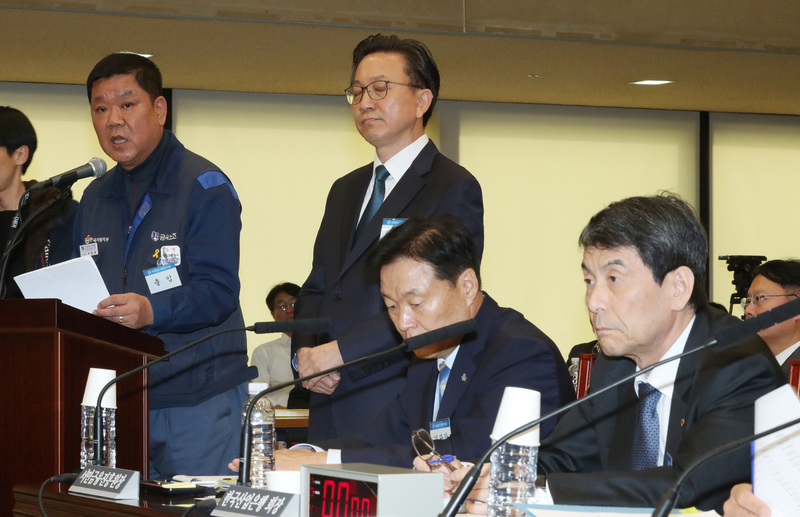 |
|
Lim Han-taek (far left), head of the GM Korea branch of the Korea Metal Workers’ Union, testifies during a National Assembly parliamentary audit concerning the corporate spinoff of GM Korea’s R&D division. To Lim’s left is GM Korea Vice President Choi Jong. Sitting on the far right is KDB chairman Lee Dong-gull. (Kang Chang-kwang, staff photographer)
|
Automaker rejects KDB’s proposal to hold trilateral dialogue with labor union
The veto power provision details 17 cases when the Korea Development Bank (KDB), GM Korea’s second-largest shareholder, can exercise its veto powers. It was agreed upon as a safeguard with GM on the condition of management normalization, but has failed to prove useful in actual issues, including the recent conflict over the automaker’s plan to split off corporate entities. Observers also say the claims of “increased management transparency” amount to little more than sloganeering, as seen with the conflict between KDB and GM Korea over the provision of information about the split. As a last-ditch measure, the KDB moved to suggest trilateral dialogue with the union in addition to its legal action. But with GM Korea rejecting this proposal, KDB has fewer and fewer avenues available to reach a compromise. According to accounts on Nov. 12 from GM Korea and KDB sources, the KDB met with the GM Korea union and management on Nov. 8 to propose holding a meeting of a “consultation group on GM Korea’s future development” – a trilateral dialogue body to discuss the conflict of the corporation split – at 2 pm on Nov. 13 at the company’s office in Incheon’s Bupyeong district. But the plan failed to come off: while the GM Korea union reportedly agreed to participate in the dialogue, the company declined and made a counterproposal of bilateral dialogue with KDB. “The trilateral dialogue format could complicate things and impede progress in constructive dialogue,” a GM Korea source said. The KDB found itself in an even more awkward position as a result. With the possibility of dialogue barred, the only remaining option would be legal action – but this approach too holds uncertain prospects of success. According to information acquired by the Hankyoreh on GM Korea’s ninth amended articles of association, the veto provisions of 17 cases (including veto rights on general shareholders’ meeting approval) cited by the South Korean government and KDB as “management safeguards” in their management normalization agreement last May offers little to no resources in terms of checking regular management activities related to suspected preparations for a GM withdrawal from South Korea. The articles were amended on May 21, shortly after a basic contract on management normalization was signed on May 18. Veto rights on the sale, transfer, or acquisition of assets exceeding 20 percent of total assets in transactions with third parties were renewed for another 10 years, while the remaining provisions preserved and maintained existing terms. In most cases, the provision of KDB’s veto in the articles only permit KDB’s veto powers to be invoked at the stage of “actual withdrawal” – the initiation of company liquidation, dismantlement, and bankruptcy procedures – in cases where alterations in shareholder ownership occur or sales, transfers, and/or acquisitions of assets beyond the set value occur through the issuance of stocks or negotiable securities at the majority shareholder’s direction. While veto powers do exist for management actions such as absorption, creation of new entities, and reorganizations – the sorts of management activities that have led to suspicions that GM plans to pull out of South Korea – the rules granted exceptions in cases where such actions were not deemed to influence the actual equity situation. The same terms were cited as a basis for a court’s decision to deny the KDB’s application for an injunction to bar a shareholders’ meeting on the corporation split issue. KDB submits appeal for suspension of validity of shareholders’ decision Shortly after the injunction application was dismissed, the KDB submitted an Oct. 26 appeal asking for a suspension on the validity of the shareholders’ meeting decision. The gist of the appeal was that the split was subject to the bank’s veto – but it remains uncertain whether the bid will succeed. Besides the veto powers, other management safeguards announced by the government and KDB following their May management normalization agreement with GM amounted to increased management transparency – including the provision of management data – and phased restrictions on the sale of equity over the next 10 years. But the attempt to increase management transparency appears to have been all but neutralized. Last month, the KDB and GM Korea locked horns over the provision of corporation split data during a parliamentary audit. A KDB official said the bank had “requested a business plan to make a decision on whether the corporation split would be advantageous or disadvantage” but was “provided only with a technical plan on the changes in assets, liabilities, and personnel in the event of a split.” The episode suggested that with the GM Korea restructuring conflict temporarily put to bed, the repeated controversy over opaque management practices appears likely to continue going ahead. By Jung Se-ra and Hong Dae-seon, staff reporters Please direct comments or questions to [english@hani.co.kr]






